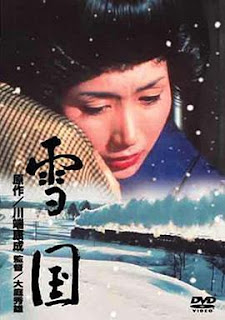33. Thiaⁿ-kóng í-keng kòe-tiāⁿ ah
Shimamura hòⁿ-kî, chheⁿ-mê lâng khòaⁿ-tio̍h ká-ná khah siàu-liân, kóng:
"Góa khak-tēng, lí sè-hàn bat liān kòe."
"Chhiú sui-bóng tih kâng lia̍h-liông, m̄-koh góa ê hīⁿ-khang iáu chin lāi. Gē-tòaⁿ ê samisen tôaⁿ kah chit-lō khoán, thiaⁿ tio̍h kiâng boeh lún bē tiâu. Sī ah, tō ná-chhiūⁿ hit-tong-sî ê góa neh." Án-ne kóng liáu, yi koh chù-ì thiaⁿ:
"Ká-ná sī Izutsuya (井筒屋) ê Fumi Chan tih tôaⁿ. Siāng-hó ê hām siāng-bái ê siāng hó hun-pia̍t."
"Mā ū gâu tôaⁿ ê?"
"Ū chi̍t-ê kiò Komako ê ko͘-niû, sui-bóng siàu-liân, chín í-keng sī se̍k-chhiú ah-lah."
"Chin-ê?"
"Thâu-ke San, lí kám bat yi? Sui-bóng gâu tôaⁿ, m̄-koh sī tī chit-ê soaⁿ-chng lâi kóng ê."
"Bô, m̄-bat. Cha-àm yin sai-hū ê hāu-seⁿ tún lâi, góa hām i kāng chhia."
"Oh? Sin-thé hó ah, chiah tún lâi hioh?"
"Khòaⁿ khí-lâi m̄-sī án-ne."
"Hăⁿ? Thiaⁿ-kóng yin hāu-seⁿ tī Tokyo pēⁿ chìn kú, Komako ko͘-niû chiah tio̍h chū joa̍h--lâng chhut-lâi chò gē-tòaⁿ, hù pēⁿ-īⁿ ê chîⁿ, m̄-chai āu-lâi án-nóa ah?"
"Hit-ê Komako hioh?"
"Sī ah, sui-bóng kan-ta kòe-tiāⁿ niâ, mā tio̍h chīn-liāng tàu chhut-la̍t, kú-tn̂g lâi..."
"Kòe-tiāⁿ ah, kám chin ê?"
"Sī ah. Thiaⁿ-kóng í-keng kòe-tiāⁿ ah. Góa bô chin chheng-chhó, sī lâng án-ne kóng ê."
Tī un-chôaⁿ kheh-chàn thiaⁿ lia̍h-liông cha-bó͘ kóng gē-tòaⁿ ê sin-sè chin sù-siông, in-ūi sù-siông, tian-tò ì-gōa. Komako ūi tio̍h bī-hun-hu chiah chhut-lâi chò gē-tòaⁿ, pún-chiâⁿ mā sī sù-siông ê tāi-chì, m̄-koh Shimamura tō sī kám-kak bē sóng. Che tāi-khài sī hām tō-tek koan-liām sio tùi-ke̍h ê iân-kò͘ lah.
I goân-pún siūⁿ boeh ke thiaⁿ chi̍t-kóa, m̄-koh lia̍h-liông--ê tiām khì ah.
Komako sī yin sai-hū hāu-seⁿ ê bī-hun-chhe, Yoko sī i ê sin ài-jîn, iah i iū pēⁿ kah tit-boeh sí ah, Shimamura ê thâu-khak lāi iū phû chhut "bô-chhái kang" chit-ê jī-gán. Komako chun-siú hun-in ê iak-sok iā-hó, bē-sin lâi ūi i liâu-iáng iā-hó, che it-chhè m̄-sī bô-chhái kang, sī sáⁿ?
--
33. 聽講已經過定 ah
Shimamura 好奇, 青盲人看著 ká-ná 較少年, 講:
"我確定, 你細漢 bat 練過."
"手雖罔 tih kâng 掠龍, 毋過我 ê 耳空猶真利. 藝旦 ê samisen 彈 kah chit-lō 款, 聽著 kiâng 欲 lún 袂牢. 是 ah, tō ná 像彼當時 ê 我 neh." Án-ne 講了, 她 koh 注意聽:
"Ká-ná 是 Izutsuya (井筒屋) ê Fumi Chan tih 彈. 上好 ê 和上䆀 ê 上好分別."
"Mā 有 gâu 彈 ê?"
"有一个叫 Komako ê 姑娘, 雖罔少年, chín 已經是熟手 ah-lah."
"真 ê?"
"頭家 San, 你敢捌她? 雖罔 gâu 彈, 毋過是 tī 這个山庄來講 ê."
"無, 毋捌. 昨暗姻師傅 ê 後生 tún 來, 我和伊仝車."
"Oh? 身體好 ah, 才 tún 來 hioh?"
"看起來毋是 án-ne."
"Ha̋ⁿ? 聽講姻後生 tī Tokyo 病晉久, Komako 姑娘才著 chū 熱--人出來做藝旦, 付病院 ê 錢, 毋知後來 án-nóa ah?"
"彼个 Komako hioh?"
"是 ah, 雖罔干焦 kòe-tiāⁿ niâ, mā 著盡 liāng 鬥出力, 久長來..."
"Kòe 定 ah, 敢真 ê?"
"是 ah. 聽講已經過定 ah. 我無真清楚, 是人 án-ne 講 ê."
Tī 溫泉客棧聽掠龍查某講藝旦 ê 身世真四常, 因為四常, 顛倒意外. Komako 為著未婚夫才出來做藝旦, 本成 mā 是四常 ê 代誌, 毋過 Shimamura tō 是感覺袂爽. 這大概是和道德觀念相對 ke̍h ê 緣故 lah.
伊原本想欲加聽一寡, 毋過掠龍 ê 恬去 ah.
Komako 是姻師傅後生 ê 未婚妻, Yoko 是伊 ê 新愛人, iah 伊又病 kah 得欲死 ah, Shimamura ê 頭殼內又浮出 "無彩工" 這个字眼. Komako 遵守婚姻 ê iak 束也好, 賣身來為伊療 iáng 也好, 這一切毋是無彩工, 是啥?
--
33.
Did all blind people look younger than they were? Shimamura wondered.
"But if you learn when you're young, you never forget."
"My hands have changed from qoing this sort of work, but my ear is still good. It makes me very impatient to hear them playing. But then I suppose I felt impatient at my own playing when I was young." She listened for a time. "Fumi at the Izutsuya, maybe. The best ones and the worst are the easiest to tell."
"There are good ones?"
"Komako is very good. She's young, but she's improved a great deal lately."
"Really?"
"You know her, don't you? I say she's good, but you have to remember that our standards here in the mountains are not very high."
"I don't really know her. I was on the train with the music teacher's son last night, though."
"He's well again?"
"Apparently not."
"Oh? He's been sick for a long time in Tokyo,
and they say it was to help pay the doctors' bills that Komako became a geisha last summer. I wonder if it did any good."
"Komako, you say?"
"They were only engaged. But I suppose you
feel better afterwards if you've done everything you can."
"She was engaged to him?"
"So they say. I don't really know, but that's the rumor."
It was almost too ordinary a thing to hear gossip about geisha from the hot-spring masseuse, and that fact had the perverse effect of making the news the more startling; and Komako's having become a geisha to help her fiance was so ordinary a bit of melodrama that he found himself almost refusing to accept it. Perhaps certain moral considerations-questions of the propriety of selling oneself as a geisha-helped the refusal.
Shimamura was beginning to think he would like to go deeper into the story, but the masseuse was silent.
If Komako was the man's fiancee, and Yoko was his new lover, and the man was going to die-the expression "wasted effort" again came into Shimamura's mind. For Komako thus to guard her promise to the end, for her even to sell herself to pay doctors' bills-what was it if not wasted effort?
--


No comments:
Post a Comment